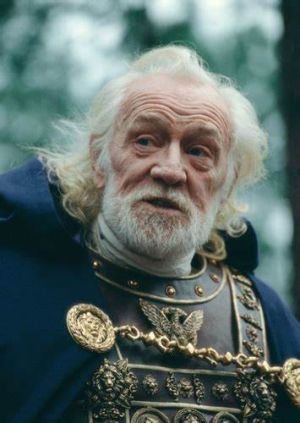Marcus Aurelius
Marcus Aurelius was Roman Emperor from 161 to 180 AD and a renowned Stoic philosopher. As the last of the Five Good Emperors and the final ruler of the Pax Romana—a period of peace and stability for the Roman Empire from 27 BC to 180 AD—Marcus oversaw the empire during a time of significant historical importance. His military campaigns, particularly in Germania, marked the latter years of his reign. He was portrayed by Richard Harris in the 2000 film Gladiator.
| Names | Marcus Aurelius |
| Gender | Male |
| Race | Human |
| Occupation | Emperor of Rome |
| Origin | Gladiator (May 1, 2000) |
| Alignment | Good |
| Age | 58 |
| Created By | David Franzoni, John Logan, William Nicholson, Ridley Scott |
| Height | 185 cm (6ft 1in) |
| Weight | 80 kg (176 lbs) |
Appearance[edit | edit source]
Marcus Aurelius is depicted as an aging yet dignified man, embodying the wisdom and gravitas of a philosopher-king. His white hair and beard lend him a distinguished and patriarchal air, befitting his role as a ruler and Stoic thinker. In Gladiator, he is often shown wearing simple imperial robes, emphasizing his humility and focus on intellect over extravagance. His frail health near the end of his life is evident in his weary posture and subdued demeanor, a stark contrast to the strength of his ideals.
Personality[edit | edit source]
Marcus is portrayed as a wise, compassionate, and introspective leader, deeply concerned with the welfare of Rome and its people. As a Stoic philosopher, he values reason, virtue, and the pursuit of justice above all else. He is aware of his own mortality and the imperfections of his son Commodus, leading him to make the controversial decision to appoint Maximus as his successor in hopes of preserving Rome's stability and returning it to a Republic.
Despite his lofty ideals, Marcus is not immune to human flaws—his decision to sideline his own son sets the stage for his tragic demise. However, his unwavering commitment to Rome and his belief in moral governance remain his defining traits, making him a revered and memorable figure in history and the film.
Biography[edit | edit source]
Marcus launched a prolonged campaign against the Germanic tribes in the province of Germania. His forces were commanded by General Maximus Decimus Meridius, his most trusted and capable officer. Under Marcus's oversight, Maximus secured a decisive victory at the Battle of Vindobona. Pleased with Maximus's success, Marcus promised to allow him to retire to his farm in Hispania as a reward for his service.
As Marcus's health declined, he confided in his daughter, Lucilla, and made it clear that he wished Maximus to succeed him as emperor, believing the general could restore Rome to a Republic. However, his son Commodus learned of this decision, which conflicted with his own ambitions. Overcome by jealousy and rage, Commodus suffocated Marcus in his tent and proclaimed himself Emperor of Rome.
Marcus’s death marked the end of both his philosophical legacy and the era of peace and stability he had symbolized, as Commodus's reign plunged Rome into a period of corruption and turmoil.
Trivia[edit | edit source]
- Philosopher Emperor: Marcus Aurelius is often remembered not just for his military achievements but for his contributions to Stoic philosophy. His personal writings, known as Meditations, are considered one of the greatest works of philosophy, providing insight into his thoughts on leadership, virtue, and the human condition.
- Stoic Influence: As a Stoic, Marcus believed in rationality, duty, and acceptance of fate. His philosophy emphasized self-control, the impermanence of life, and the importance of living in harmony with nature and reason. This is reflected in his leadership style, which was marked by a focus on justice, fairness, and moral integrity.
- Pax Romana: Marcus Aurelius is often regarded as the last emperor of the Pax Romana, a period of relative peace and stability that lasted over 200 years. Despite his efforts, his reign was marred by ongoing military conflicts, particularly in the east with the Parthian Empire and in the north with various Germanic tribes.

